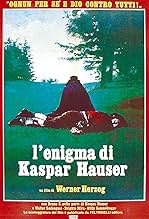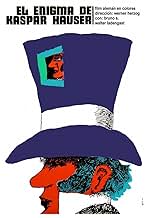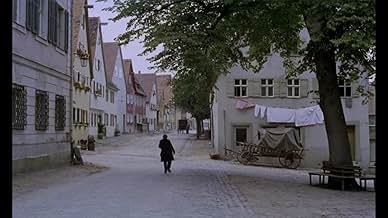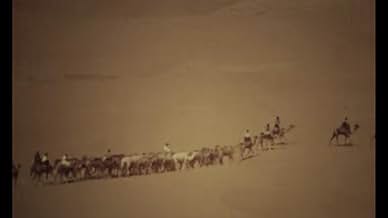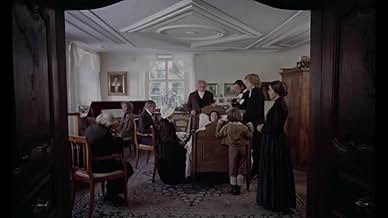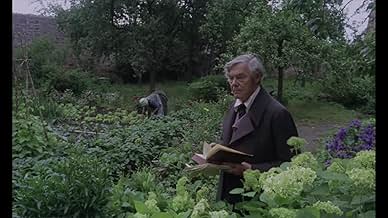AVALIAÇÃO DA IMDb
7,7/10
20 mil
SUA AVALIAÇÃO
Um jovem chamado Kaspar Hauser aparece subitamente em Nuremberg em 1828, dificilmente consegue falar ou andar, e tem uma nota estranha.Um jovem chamado Kaspar Hauser aparece subitamente em Nuremberg em 1828, dificilmente consegue falar ou andar, e tem uma nota estranha.Um jovem chamado Kaspar Hauser aparece subitamente em Nuremberg em 1828, dificilmente consegue falar ou andar, e tem uma nota estranha.
- Direção
- Roteiristas
- Artistas
- Prêmios
- 5 vitórias e 3 indicações no total
- Direção
- Roteiristas
- Elenco e equipe completos
- Produção, bilheteria e muito mais no IMDbPro
Avaliações em destaque
A truely visionary work!!I have always been fascinated with the story that this film tells.Herzog seems to be an expert at showing the way that an outsider relates to the world.Bruno S. is amazing in the lead role , Herzog has definitely made the right casting choice.the movie is just a must for all fans of cinema,even if your not a Herzog fanatic you will still be moved by this extraordinary vision!!!
Werner Herzog's strange and enticing film divulges only what is known of the account of Kaspar Hauser, played by Bruno S., who dwelled for the first 17 years of his life shackled in a small basement room with nothing more than a toy horse to occupy him, without all contact with humans or other living things save for a stranger who gives food to him. One day in 1828, the same anonymous figure takes Kaspar out of his chamber, schools him on a handful of expressions and how to walk, and then leaves him standing still in a cobblestone court in Nuremberg. Kaspar is the focus of novelty and interest and is even put on display in a circus before being saved by an aristocrat who slowly and good-naturedly endeavors to renovate him. Kaspar gradually learns to read and write and forms unorthodox perspectives on religion and logic, but music is what gives him great pleasure. He draws the attention of members of the clergy, professors, and aristocracy.
The most telling scene is in fact my favorite, when Kaspar is being schooled by a psychologist who asks him a classic brain-buster, to which Kaspar gives an effortless, unusual, perfectly legitimate answer that is swiftly rejected by the psychologist for not being the standard answer. The people surrounding Kaspar in Herzog's film are perfectly subjugated, as in the scene where a little girl tries to teach Kaspar a nursery rhyme, and while it's clear that he doesn't know the meaning at all of the rhyme like she does and that he hasn't even developed as far as a small child, it's also clear that the small child has not developed far enough to know how to educate someone with less common knowledge than her.
Herzog chronicles the real-life mystery of Kaspar Hauser not so much as a creepy mystery but as a character study that demonstrates that society's traditional manner of perceiving the world may not essentially be the most well-founded or defensible, hence the film's brilliant original title, Every Man For Himself and God Against All, as all but laid bare when Kaspar's assertion that apples are tired is apparently substantiated by the incapability of his aristocratic savior to show support of the argument that they are lifeless objects subject to human control.
Bruno S. is Herzog's beautiful achievement. Bruno S., the disdained son of a prostitute, was beaten so cruelly by his mother as a toddler that he fell deaf for awhile. This caused him to be institutionalized for the next 23 years in countless institutes, regularly committing petty crimes. Regardless of this horrendous history, he became an autodidactic painter and musician. At the same time as these were his beloved pursuits, he was also pressed to take jobs in factories. Herzog saw him in a 1970 documentary, he swore to work with him. In and of himself, Bruno S. attested to the power of Herzog's vision. He was exceptionally strenuous to work with, at times not so much wanting but requiring numerous hours of screaming a scene could be shot. Owing to all of this, Bruno S. literally is a Kaspar Hauser, an inordinately tortured soul utilized for the sake of revealing the shock value of reality's hidden ugliness to common society. Kaspar is taken under the wing of several groups of people but whether their intentions are good or bad, he can never seem to live a life without the exploitation of his completely removed mind for the commotion of nobility or business.
Short of an accepted narrative or dramatic construction and full of indistinct imagery generated only by Herzog's instinct, many unexplained elements never resolve themselves in Herzog's unique character study, and they shouldn't. His encapsulating only what the world knows of this very little-known story intensifies the intrigue of it. Why did this strange person do this to Kaspar Hauser? Who was he?
The most telling scene is in fact my favorite, when Kaspar is being schooled by a psychologist who asks him a classic brain-buster, to which Kaspar gives an effortless, unusual, perfectly legitimate answer that is swiftly rejected by the psychologist for not being the standard answer. The people surrounding Kaspar in Herzog's film are perfectly subjugated, as in the scene where a little girl tries to teach Kaspar a nursery rhyme, and while it's clear that he doesn't know the meaning at all of the rhyme like she does and that he hasn't even developed as far as a small child, it's also clear that the small child has not developed far enough to know how to educate someone with less common knowledge than her.
Herzog chronicles the real-life mystery of Kaspar Hauser not so much as a creepy mystery but as a character study that demonstrates that society's traditional manner of perceiving the world may not essentially be the most well-founded or defensible, hence the film's brilliant original title, Every Man For Himself and God Against All, as all but laid bare when Kaspar's assertion that apples are tired is apparently substantiated by the incapability of his aristocratic savior to show support of the argument that they are lifeless objects subject to human control.
Bruno S. is Herzog's beautiful achievement. Bruno S., the disdained son of a prostitute, was beaten so cruelly by his mother as a toddler that he fell deaf for awhile. This caused him to be institutionalized for the next 23 years in countless institutes, regularly committing petty crimes. Regardless of this horrendous history, he became an autodidactic painter and musician. At the same time as these were his beloved pursuits, he was also pressed to take jobs in factories. Herzog saw him in a 1970 documentary, he swore to work with him. In and of himself, Bruno S. attested to the power of Herzog's vision. He was exceptionally strenuous to work with, at times not so much wanting but requiring numerous hours of screaming a scene could be shot. Owing to all of this, Bruno S. literally is a Kaspar Hauser, an inordinately tortured soul utilized for the sake of revealing the shock value of reality's hidden ugliness to common society. Kaspar is taken under the wing of several groups of people but whether their intentions are good or bad, he can never seem to live a life without the exploitation of his completely removed mind for the commotion of nobility or business.
Short of an accepted narrative or dramatic construction and full of indistinct imagery generated only by Herzog's instinct, many unexplained elements never resolve themselves in Herzog's unique character study, and they shouldn't. His encapsulating only what the world knows of this very little-known story intensifies the intrigue of it. Why did this strange person do this to Kaspar Hauser? Who was he?
"This is the story of a soul", someone said and I agree because loneliness is here described through a slow moving plot and endless silences which make us see Kaspar Hauser not as a man but as something more sulfuric, almost a being from outer space. The performance of Bruno S. is simply moving and caused me a lot of tears and the use of time through the narration is perfect for a film of this kind. The poetic vision of Werner Herzog is very peculiar and unique and you can love it or hate it but you cannot ignore it. Herzog doesn't care about the audience, he tells what it wants in the way he likes and that's the praise and the defect of European cinema and it's what makes the difference between European authors and American ones.
Werner Herzog's films reach emotional and aesthetic levels that few directors can aspire to. As one of the rare film-maker's more concerned with the artistry of their work than what they achieve at the box office, Herzog is nearly peerless in his purity and ideosynchrasy. Herzog uses the film medium as a moving canvas upon which he expresses, affects, and creates nightmares and dreamworlds which are so vividly real that they threaten our own naturalized consciousness of the projection we call reality.
So much for the postmodern gobbledygook. As you can tell, I love Herzog.
This early film deals with many of the familiar elements that tend to permeate Herzog's films - cultural critique, the insanity of everyday life, alienation, cruelty and power. But here, Herzog uses a true story of 19th century Europe as a vehicle, and treats his subject with an unusual compassion and straightforwardness.
Herzog's incredible casting talent also shows here, just as it does in all of his films. I do not wish to take anything away from the great performers, but really, how does one manage to choose an actor whose life experience is broadly similar to that of Kaspar Hauser's without knowing of it beforehand? This film blends somewhat disjointed artistic imagery with the true story of Kaspar Hauser, a man apart from society who has been kept in a cellar all of his life, and is suddenly expelled into the light in Nuremburg. He is adopted by a kindly old gent who attempts to socialize him in what appears to Kaspar (and perhaps to us through the film's clear vision) an insane society full of lies and contradictions. All of this is done with the believability that is so consistent in Herzog's theatricality, and the visual quality that qualifies him as a true cinematographic artist.
So much for the postmodern gobbledygook. As you can tell, I love Herzog.
This early film deals with many of the familiar elements that tend to permeate Herzog's films - cultural critique, the insanity of everyday life, alienation, cruelty and power. But here, Herzog uses a true story of 19th century Europe as a vehicle, and treats his subject with an unusual compassion and straightforwardness.
Herzog's incredible casting talent also shows here, just as it does in all of his films. I do not wish to take anything away from the great performers, but really, how does one manage to choose an actor whose life experience is broadly similar to that of Kaspar Hauser's without knowing of it beforehand? This film blends somewhat disjointed artistic imagery with the true story of Kaspar Hauser, a man apart from society who has been kept in a cellar all of his life, and is suddenly expelled into the light in Nuremburg. He is adopted by a kindly old gent who attempts to socialize him in what appears to Kaspar (and perhaps to us through the film's clear vision) an insane society full of lies and contradictions. All of this is done with the believability that is so consistent in Herzog's theatricality, and the visual quality that qualifies him as a true cinematographic artist.
Herzog has a way with documenting history as if it was our own past we were re-living. It all seems strangely familiar, yet slightly surreal. This film is rich with detail of the period (19th century), yet it's not the slightest bit in-your-face like so many of the current period films that seem to be about nothing more than lush furniture and the people who sit on them. Yet there are images here that you'll never forget! There are some especially stunning sepia dream sequences of an Arabian caravan strolling in soft, slow-motion across a windswept desert. They reminded me of Sam Fuller's effective use of raw colour footage of distant lands in "Shock Corridor". Images that seem to burst out at us from the B&W angst of a mental ward. Such contradictory images seem perfectly normal in Herzog's world, since after all, they're from the world of our dreams.
As always, Herzog finds great music for his score in this film, and he uses it in a very subtle way. But he also is a master at allowing silences to tell part of his story. If one is really listening, they can hear a great many things that define the world that his characters are inhabiting. This of course, was more obvious in films like 'Aguirre', where one swears they can still hear the wild birds squawking in their head for days! Can any film-going experience be more real?
But this film is not all just sound and imagery! The story is a puzzle. It's up to us viewers to decide who this man is and how his mind functions. It also challenges us to think about how our own minds function. While various "instructors" try to cram a lifetime of education into Kaspar's brain in just a few short years, we are forced to re-evaluate the logic that we have been taught. This is illustrated with great tongue-in-cheek humour when Kaspar approaches a lesson in logic with a Zen-like understanding that leaves his instructors livid. Needless to say, this film is a good preamble to "Being There", only more subtle, more haunting, and far more memorable.
The film will also bring to mind "The Elephant Man", not just in its depiction of circus "freaks", but in its illustrations of cruelty, madness, kindness and alienation. It is in essence, a movie about humanity. Told in a poetic vision with just the right doses of wit, intelligence and mystery. For this is, The MYSTERY of Kaspar Hauser. The film never pretends to be a documentation. It is simply an interpretation. One man's imagining of what might have gone inside the mind of a man who was born into the world at sixteen. See it with that in mind, and you'll have one of the richest movie-going experiences in your life!
As always, Herzog finds great music for his score in this film, and he uses it in a very subtle way. But he also is a master at allowing silences to tell part of his story. If one is really listening, they can hear a great many things that define the world that his characters are inhabiting. This of course, was more obvious in films like 'Aguirre', where one swears they can still hear the wild birds squawking in their head for days! Can any film-going experience be more real?
But this film is not all just sound and imagery! The story is a puzzle. It's up to us viewers to decide who this man is and how his mind functions. It also challenges us to think about how our own minds function. While various "instructors" try to cram a lifetime of education into Kaspar's brain in just a few short years, we are forced to re-evaluate the logic that we have been taught. This is illustrated with great tongue-in-cheek humour when Kaspar approaches a lesson in logic with a Zen-like understanding that leaves his instructors livid. Needless to say, this film is a good preamble to "Being There", only more subtle, more haunting, and far more memorable.
The film will also bring to mind "The Elephant Man", not just in its depiction of circus "freaks", but in its illustrations of cruelty, madness, kindness and alienation. It is in essence, a movie about humanity. Told in a poetic vision with just the right doses of wit, intelligence and mystery. For this is, The MYSTERY of Kaspar Hauser. The film never pretends to be a documentation. It is simply an interpretation. One man's imagining of what might have gone inside the mind of a man who was born into the world at sixteen. See it with that in mind, and you'll have one of the richest movie-going experiences in your life!
Você sabia?
- CuriosidadesTo perform the scene in which Kaspar learns to walk, actor Bruno S. knelt for three hours with a stick behind his knees until his legs were too numb to stand.
- Erros de gravaçãoIn a brief scene we see a stork eating a frog with its legs tagged (ringed), but bird ringing didn't start until the end of the nineteenth century, decades after the life of Kaspar Hauser.
- Citações
Opening caption: Do you not then hear this horrible scream all around you that people usually call silence.
- Cenas durante ou pós-créditosOpening credits prologue: One Sunday in 1828 a ragged boy was found abandoned in the town of N. He could hardly walk and spoke but one sentence.
Later, he told of being locked in a dark cellar from birth. He had never seen another human being, a tree, a house before.
To this day no one knows where he came from - or who set him free.
Don't you hear that horrible screaming all around you? That screaming men call silence?
- ConexõesFeatured in Was ich bin, sind meine Filme (1978)
- Trilhas sonorasCanon in D major
Composed by Johann Pachelbel
Principais escolhas
Faça login para avaliar e ver a lista de recomendações personalizadas
- How long is The Enigma of Kaspar Hauser?Fornecido pela Alexa
Detalhes
- Data de lançamento
- País de origem
- Idioma
- Também conhecido como
- The Enigma of Kaspar Hauser
- Locações de filme
- Croagh Patrick, Westport, Mayo, Irlanda(archive footage)
- Empresas de produção
- Consulte mais créditos da empresa na IMDbPro
Bilheteria
- Faturamento bruto mundial
- US$ 3.451
- Tempo de duração
- 1 h 50 min(110 min)
- Mixagem de som
- Proporção
- 1.66 : 1
Contribua para esta página
Sugerir uma alteração ou adicionar conteúdo ausente


